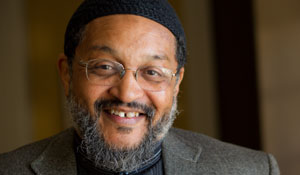“A connection between Greek Life and the Islamic faith is something that students may never draw,” said sophomore member of Sigma Phi Epsilon Faraz Ahmed.
However, seeing an opportunity to create a beneficial relationship between the two, Sigma Phi Epsilon worked with Imam Khalid Griggs to put together an event this Tuesday evening. The discussion that they hosted gave students an opportunity to hear Griggs speak about his work in Islam, his own journey in social justice and how Greek Life can work to improve campus cohesion.
“I think this is important for the overall health of this school, and it is everyone’s responsibility to get to know their fellow classmate by learning about who they are, what their beliefs are and ultimately understanding that they are no different than you and I,” Ahmed said.
Griggs, the associate chaplain of Muslim life at Wake Forest, is also the vice president of the Islamic Circle of North America and one of the founding members of Muslims for Social Justice. However, his journey in Islam began when growing up as a Baptist in Winston-Salem.
Griggs joined Islam his senior year at Howard University, influenced in large part by the turbulent social movements surrounding his time at Howard, including Women’s Rights, Civil Rights, Black Power, the American Indian movement and the Native American movement.
“I grew up in a Baptist Church … so I came from a religious background,” Griggs said. “But for some reason, it didn’t seem that the religion and practice I had was enough to carry me from one Sunday morning to the next. It wasn’t enough structure for me … so I started to look for some system of life that would give me a kind of grounding that would allow me to be consistent in what I wanted to do.”
Griggs found that system in the religion of Islam.
“A person like myself understood that if I genuinely wanted to reflect values of Islam, then I had to stand for what was right,” Griggs said.
Throughout his journey, Griggs notes that he still does not feel as though he left Christianity.
Rather, because many of the principles he learned through Christianity still guide his life today, he feels that his religious journey merely began there, as one portion of the ‘oneness,” or ‘Tawhid,’ which is a central belief to Islam.
That belief in ‘oneness’ is one of the very things which inspired Griggs to join Islam, and become a leader within the community.
Ahmed was inspired to coordinate the event in large part by the curiosity of his fraternity brothers toward his religious background.
He feels that his brothers’ interest in learning about a variety of backgrounds and perspectives on this campus represents a key way in which Wake Forest can foster a tighter knit community.
“Although Greek Life does help individuals in many ways to accomplish their goals and socialize greatly, it still hinders the student from completely connecting with others on campus,” says Ahmed. “Students usually just limit their involvement within their respective fraternities or sororities, which doesn’t allow for their exposure to other groups, individuals or religious organizations. Having made this connection [between Islam and Greek Life], now provides students a platform to learn, engage and build relationships with other groups on campus.”
Griggs, also, emphasized the value of creating connections between different communities within Wake Forest life.
“Wake Forest has somewhat of a privileged reputation; there’s nothing wrong with that,” said Griggs. “But sometimes, if folks come from a certain degree of privilege, they can become so isolated from what the other 99 percent are going through.”
Griggs noted that Greek organizations have a unique capacity and network for fostering change and supporting various causes.
In doing such work, Griggs encourages students to be wary of blindly receiving information, especially from the media.
“The biggest obstacle in any institution of shift in the way things are being done … is the media,” said Griggs. “The media gives people the justification for dismissing certain populations … the media perpetuates stereotypes of the propensity of certain people, like African Americans and Latinos, to commit crimes.”
Ultimately, the goal of this event, and the work of many groups on campus, is simple.
“At the end of the day, we want everyone to live in a safe, friendly and loving environment, and that can only be done if all of us work together to put apart our differences and look at what our similarities are,” said













